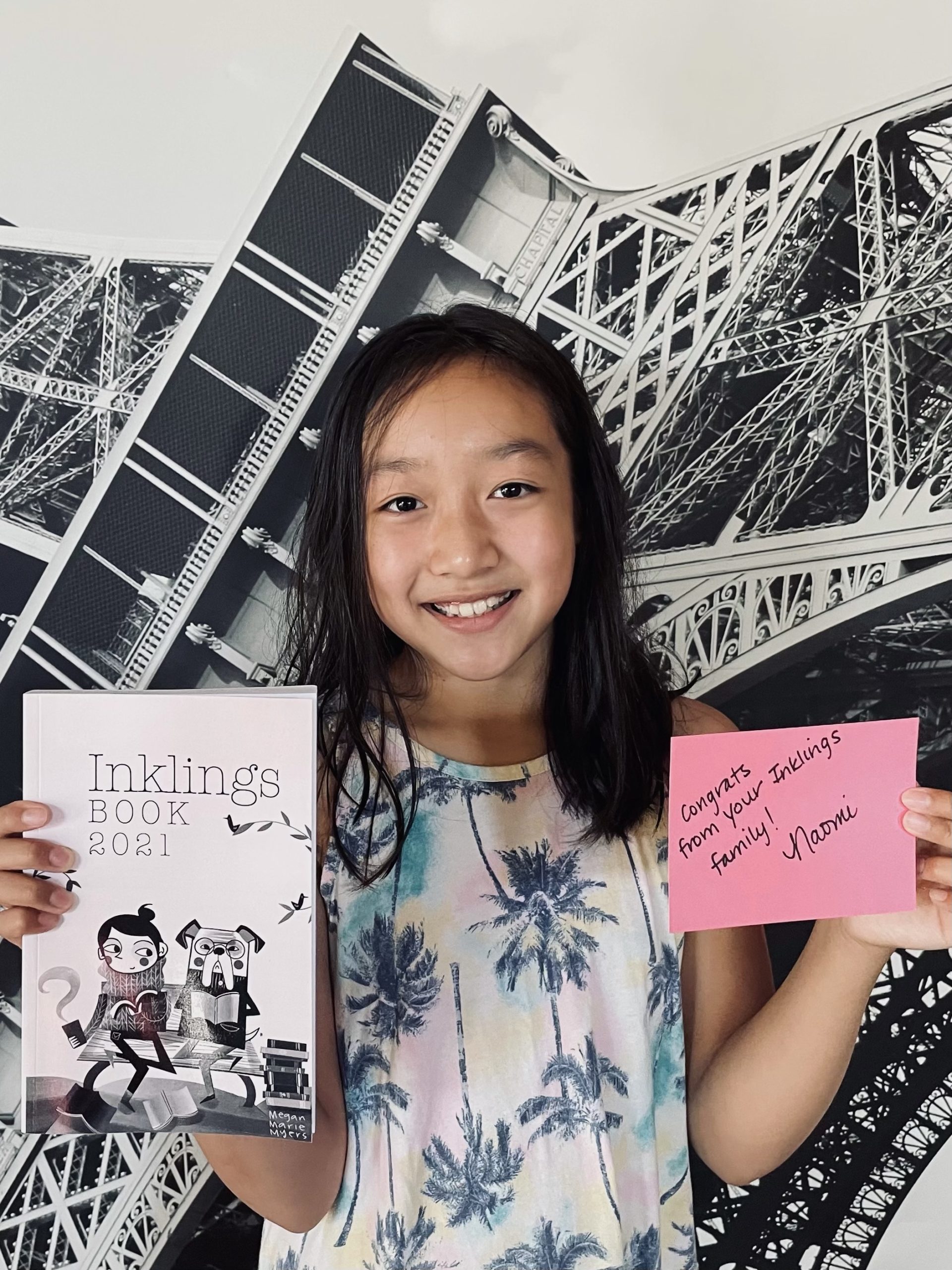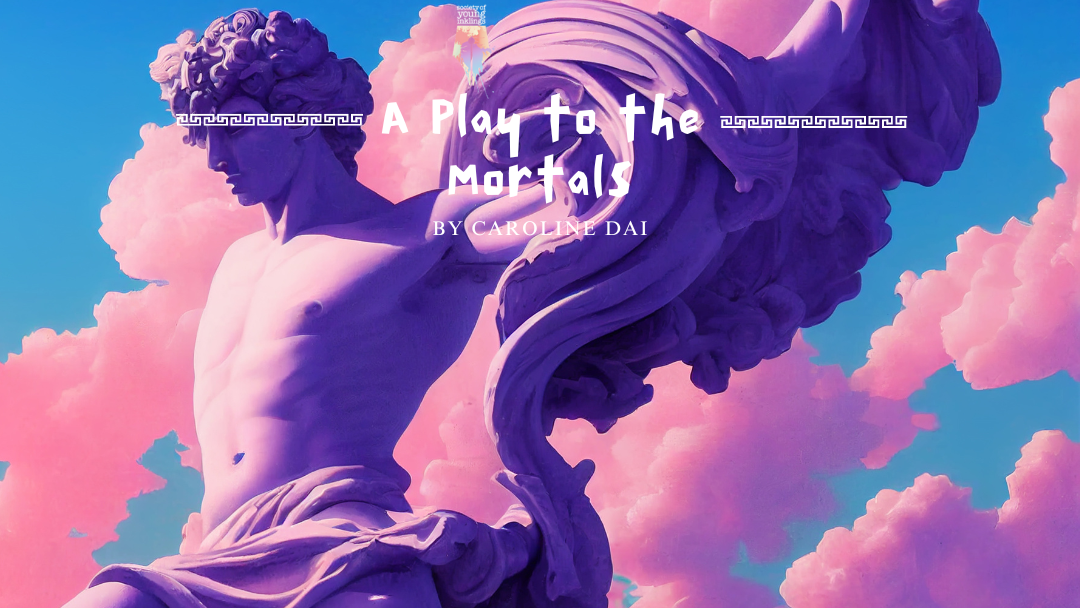Today, we are featuring Inklings Book Contest 2024 finalist Caroline Dai! She finished 7th grade this past school year and wrote an eloquent and flowing story titled, “A Play to the Mortals.” Our judges said that Caroline’s tone, “gives a rich, story-time feel that sets up a great narrative.” Continue below to enjoy Caroline’s work in digital book or plain text form.
In the cosmic space, between the real world and the world of ghosts and phantasy, lies the land of dreams. And in the heart of the land of dreams, lies Hypnos, the god of sleep, with his slumberous flowers and soft, warm cushions.
In the warm, vapourish air, lay bodies young and old. And in them all, the three sons, who had the matching gentle white wings as the god of sleep; Morpheus, Phobetor, and Phantasos. Each day they watched their father use his wand to caress all beings. Their mother Pasithea, goddess of relaxation and meditation, sat next to his father, seemingly in another space.
The eldest of three sons, Morpheus, was particularly lonely and not well-liked among his peers—for he was always closing his eyes or opening them wide open; imagining another place and world where he could eat all the delish, and have all children worship him. Of course, that would not be true, however Morpheus tried to make it.
So, each day, he laid his warm stomach to the moist clouds and peeked at the mortals—especially the young—who were lying around, dirtied and depressed.
One day, Morpheus flew down to Earth with an exciting air. He approached a young boy his age but soon found confusion taking over his smile.
“Hello,” he blinked.
“H-hi?” the boy tilted his head.
“My name is Morpheus. I am from Mount Olympus.”
“Wow!” The boy’s face flushed with excitement. “How I am glad to meet you.”
“I have always wondered why you and others lay with such solemnity. Why is that?”
“Well…” the young boy began.
Surprisingly, Morpheus felt pure delight, as he played and played, talked and talked with the mortal who enjoyed his company, and quickly became a dear friend of his. Adonis even shared with Morpheus half of his mushy oatmeal—a huge gesture—as they discussed another world far away from theirs.
Morpheus was amazed at how fast he had become friends with the dear mortal, for it is something he quite struggled with. But he could feel that Adonis was different. Kinder. Someone he felt destined to befriend.
“Oh, Adonis. You mortals are much better than the immortals back home, and my father is never amiable. I truly wish we could accompany each other forever.”
“Morpheus, my friend,” Adonis sighed, “I do feel the same for you. But, perhaps on the bright side, I envy you. How I wish I had the food and warmth, relaxation and education you do! We—”
But Adonis froze, for he nearly passed out at the sight of a man behind him. Wings flapping ridiculously, Morpheus’s father, Hypnos, seized the immortal boy in his arms just as he spun. Morpheus cried, tears turning into small puffs of clouds as he was dragged back above.
Morpheus desired friends more than ever, and could not bear leaving Adonis—a true kindred—and return to the land of dreams in the sky, away from the wonder. Then he thought of his friend, who claimed that Olympus was the true wonder.
Then the urge came flooding through him—an urge to give his beloved friend and other miserable children what they deserved. But it all did not matter now. All his life was being taken away again by his menacing father! He wanted to stay forever with his friend. Why couldn’t he?
That night, Morpheus led his two brothers out of the land of dreams. They curled up beside a magical lake, which glistened with the spilling stars. They sat and dipped their feet into the lake, the ripples doubling with Morpheus’s musing.
How could I see Adonis again? Without the all-knowing father realizing? Without ever being disturbed again?
But little did Morpheus and his two brothers know, their feet were covered in the slumberish flower powder from their home, and made the lake water cloud with sleep.
Then, Phobetor, the second eldest brother, splashed Morpheus with water, for he was naughty and always moving, and could not stand silence.
“Come on!” Phobetor grinned.
“Brother! You do know that this is not-”
But Morpheus trailed off, for he felt a tinge in his stomach. Surprisingly, Morpheus
splashed his brother back, and the three brothers started splashing in the water, laughing into the night.
“Phobetor, Phantasos. My brothers. How about we conduct our own play and pretend like we’re mortals?”
“Y-y-yes, brother,” Phantasos, the youngest, replied. He was invisible and always quiet; bored and always boring.
“Well, I will play the monsters!” Phobetor announced, splashing more water.
“Yes, yes. And I will be myself, meeting my friend,” Morpheus beamed. “And Phantasos. You will be the objects. The chair, in which we will sit as our monster licks our cheeks.”
And so the play came to play. But miraculously, as he imagined his brothers as a monster and as a stool, and as Adonis thought of the boy with wings even in his sleep, Morpheus felt that Adonis was truly right beside him. And as for Adonis… He saw the same thing. But it was real! In fact, it was the first ever time he had seen, no, experienced something in his sleep!
Adonis and Morpheus talked as the stool hummed and the monster licked their cheeks graciously.
However, soon, morning arose and Adonis was as gone as ever. But this time Morpheus knew how he would be able to meet with his dear, beloved friend once again.
The same morning, the three brothers laughed and danced in sunlight, for they had become their own gods, earlier than any other. As Morpheus and Phobetor spent the day talking and splashing each other, Phantasos went to the land of dreams and carried back flower after flower.
As they dumped the flowers in the river, Morpheus suddenly exclaimed. “Dreams! We should call our play dreams. And we shall give them to Zeus, who will make my friend and other children live with food and happiness!”
That night, the three boys gave a nightmare to Zeus, an idea a term Phobetor had come up with. In the dream that scares, Morpheus acted as a human and was hungry and desperate for water, food, and shelter. Then, Phobetor made the humans all angry at the gods, for they did not give them the necessities to live. Because of that, humans stopped worshiping the gods, and monsters—Phobetor—started to roam across Olympus.
When their play ended, the three boys were more charged than ever. However, when the sun rose, a flash of thunder clashed into the mystic pond. The brothers were startled awake and flew up in shock as they saw Zeus, the king of gods.
Morpheus quickly flew down, bowing politely before the assertive god. But his head
stayed down, and his hand became clammy for he knew that the god would certainly be angered. Phobetor and Phantasos followed their brother’s lead, eyes round.
“Child! How dare you… How dare you do what you did?” Zeus’s tall build stared down at them, face pallid. “But how have you done it? Is it true? I demand an answer, you petite littles.”
“I’m sorry, Zeus! I merely bestowed you with a dream.”
“A dream?” Zeus raised his eyebrow, but Morpheus could tell that the god felt a sense of comfort. “How interesting. So, it isn’t true? The humans… They won’t do what they did?”
Morpheus nodded, for he could not lie to the king of gods. But he held onto the hope that Zeus would still grant the humans. Zeus stood, brows puckered. Fortunately, he stormed over to Morpheus and nodded.
His face set to stone soon again, “however, young lads shall not do such things. You have disrespected me. Greatly! Do you know what I would have done?”
“P-please. Give us a chance and would you so kindly consider? After all, what you saw just might come true.”
Zeus paused.
“You shall not do anything like this without my acknowledgment again! You should all reflect on what great wrong you have done.”
The brothers nodded their heads up and down, holding their breaths and awaiting an answer.
But it never came. The sky became gray and clouds huddled together around Zeus, followed by lightning—shooting straight at him. But in a flash, the sky was again as clear as a dream yet the clouds were also as gone as deftly as a dream.
“Did he agree?” Phobetor’s wings flapped ridiculously.
“I do not know,” Morpheus shook his head, dumbfounded.
“L-let us look d-down there?” Phantasos pointed at the clouds.
The rest of the day, they lay on their stomach. They watched as, miraculously, the humans started to receive water, shelter, and food.
And oh, what great joy that was for Morpheus, for he had become the messenger of gods! His dreams mean much, and will never be forgotten. And what great joy it was for Phobetor, for he conducted his own nightmare. And Phantasos—he would be responsible for the dreams that had no meaning.
What’s more, Hypnos called Morpheus and his brothers to the center of the land of dreams, where he praised them evenly and apologized for his mistakes and past arrogance—promising a change.
As for Adonis, he closed his eyes that day and knew the boy with wings was the one who had given them so much.
And after years and years, Morpheus and his brothers continued conducting dream after dream, using their wild imaginations to create a neverending paradise for themselves. Especially for Morpheus, for he had finally found where he truly belonged.
Support the Inklings Book Contest Today!
Your support of the Inklings Book Contest helps us connect with youth writers and provide them with free learning opportunities throughout the contest – as they prepare, as they enter, and as they revise their work as winners and finalists.
Will you support the next generation of writers as they find their voices and make their mark on the world?



